Works of Dietrich Bonhoeffer (16 vols.)
Digital Logos Edition
Overview
Dietrich Bonhoeffer, one of the most influential Christian martyrs in history, bequeathed to humanity a legacy of theological creativity and spirituality that continues to inspire people from a variety of backgrounds. Dietrich Bonhoeffer Works (16 vols.) offers a fresh, critical translation of Bonhoeffer’s writings, with extensive introductions, annotations, and interpretation.
This widely-acclaimed series is a translation from the German editions of Dietrich Bonhoeffer Werke. Each volume in the series is the definitive English translation of the Critical Edition and as such serves as a comprehensive and thoroughly annotated resource for the study of Bonhoeffer in the wider frame of twentieth-century thought and history.
- Provides the definitive edition of Bonhoeffer’s works and letters
- Includes extensive introductions, notes, appendixes, bibliographies, and indexes
- Contains fresh insight and translation of Bonhoeffer’s works
This is an enormous venture. Fortress Press, with the blessing of the International Bonhoeffer Society, is publishing a critical, studied, clarifying, and . . . standard-setting, if not normative version. [Dietrich Bonhoeffer] is in the select company of the giants of this century who still challenge new generations even as his writings startle us seniors with their freshness.
—Martin Marty, Context
Dietrich Bonhoeffer is the one German theologian who will lead us into the third millennium.
—Dorothy Soelle, visiting professor emeritus, Union Theological Seminary
Without doubt, Dietrich Bonhoeffer Works will be the definitive point of reference from here forward. It supersedes all previously published Bonhoeffer documents and adds new ones as well.
—Larry Rasmussen, Reinhold Niebuhr Professor Emeritus of Ethics, Union Theological Seminary
- Title: Dietrich Bonhoeffer Works
- Author: Dietrich Bonhoeffer
- Publisher: Augsburg Fortress
- Volumes: 16
- Pages: 8,132
- Christian Group: Lutheran
- Resource Type: Collected Works
- Topic: Practical Life
This title is included in the following collections
You can save when you purchase this product as part of a collection.
Logos 7 Lutheran Silver Legacy...
$349.99$349.99Logos 6 Lutheran Silver Legacy...
$349.99$349.99Logos 9 Lutheran Silver Legacy...
$349.99$349.99Dietrich Bonhoeffer Works Coll...
$399.99$399.99
- $474.99
- $549.99
- $849.99
- $849.99
- $849.99
- $849.99
- $1,499.99$1,274.99
- $1,499.99
- $1,499.99
- $1,499.99
- $1,499.99
- $2,999.99$2,549.99
- $2,999.99
- $2,999.99
- $2,999.99
- $4,749.99$4,037.49
- $4,749.99$4,037.49
- $4,749.99
- $4,749.99
- $4,749.99
- $6,399.99$5,439.99
- $5,999.99
- $5,999.99
- $10,999.99$9,349.99
- $23,999.99$20,399.99
- $21,749.99
- $24,999.99
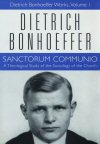
Sanctorum Communio, available for the first time in its entirety in English, includes all material omitted from the original 1930 German publication. Bonhoeffer’s doctoral dissertation sets out the theology of sociality that informed all his work, engaging social philosophy and sociology to interpret the church as “Christ existing as church-community.” Here are the roots of his commitment to the confessing church and the ecumenical movement, and of his actions in the resistance movement for the sake of peace and Germany’s future.
More instructive and stimulating and illuminating and genuinely edifying reading today than many of the more famous works which have since been written on the problem of the church. . . .
—Karl Barth, Swiss Reformed Theologian
Here may be found the fundamental, fertile premises held by the later Bonhoeffer. . . . Sanctorum Communio is a sovereign creation . . . full of restless, fertile ideas for the empiricist and the theorist, the historian, the systematic theologian, and the sociologist.
—Andrew Chandler, director, George Bell Institute, University of Chichester
The student of Bonhoeffer who wishes to know the sources of his ‘religionless interpretation of biblical concepts in a world come of age,’ the worldly Christianity of the letters from prison, will have to turn to Bonhoeffer’s early writings.
—Eberhard Bethge, Bonhoeffer’s student, editor, and biographer

Act and Being, written in 1929–1930 as Bonhoeffer’s second dissertation, deals with the questions of consciousness and conscience in theology from the perspective of the Reformation insight about the origin of human sinfulness in the “heart turned in upon itself and thus open neither to the revelation of God nor to the encounter with the neighbor.” Here, therefore, we find Bonhoeffer’s thoughts about power, revelation, otherness, theological method, and theological anthropology.
Act and Being . . . takes a Lutheran perspective on the philosophical claims of consciousness from Jant to Heidegger, vindicating the claims for God’s self-disclosure in revelation against various forms of transcendental philosophy. It is in Act and Being that the scholarly tools of this new edition are clearly most useful. . . . essential to understanding what Bonhoeffer was saying and whom he was refuting.
—Robin Lovin, Cary M. Maguire University Professor of Ethics, Southern Methodist University
‘I don’t like this product anymore,’ said Bonhoeffer only two years after he wrote Act and Being. Maybe he felt that it was too academic. Yet Bonhoeffer’s postdoctoral dissertation is necessary for understanding his early theology, especially Sanctorum Communio, and for appreciating the ongoing value of the church for all his thinking.
—Christiane Tietz, professor of systematic theology and social ethics, University of Mainz
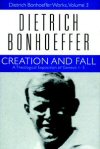
Creation and Fall originated in lectures given by Dietrich Bonhoeffer at the University of Berlin in the winter semester of 1932–1933 during the demise of the Weimar Republic and the birth of the Third Reich. In the course of these events, Bonhoeffer called his students to focus their attention on the word of God—the word of truth in a time of turmoil.
Delivered with passion and kerygmatic style rather than in the language of academic discourse, Creation and Fall retains the sense of immediacy, relevance, and power that first spoke to Bonhoffer’s students.
—John W. de Gruchy, Robert Selby Taylor Professor of Christian Studies, University of Cape Town, South Africa
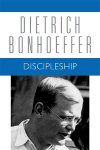
“Cheap grace is the mortal enemy of our church. Our struggle today is for costly grace.” And with that sharp warning to his own church, which was engaged in bitter conflict with the official nazified state church, Dietrich Bonhoeffer began his book Discipleship (formerly entitled The Cost of Discipleship). Originally published in 1937, it soon became a classic exposition of what it means to follow Christ in a modern world beset by a dangerous and criminal government. At its center stands an interpretation of the Sermon on the Mount: what Jesus demanded of his followers—and how the life of discipleship is to be continued in all ages of the post-resurrection church.
“Every call of Jesus is a call to death,” Bonhoeffer wrote. His own life ended in martyrdom on April 9, 1945. Freshly translated from the German critical edition, Discipleship provides a more accurate rendering of the text and extensive aids and commentary to clarify the meaning, context, and reception of this work and its attempt to resist the Nazi ideology then infecting German Christian churches.

The stimulus for the writing of Life Together was the closing of the preacher’s seminary at Finkenwalde. The treatise contains Bonhoeffer’s thoughts about the nature of Christian community based on the common life that he and his seminarians experienced at the seminary and in the “Brother’s House” there. Bonhoeffer completed the writing of Life Together in 1938.
Prayerbook of the Bible is a classic of Christian spirituality. In this theological interpretation of the Psalms, Bonhoeffer describes the moods of an individual’s relationship with God and also the turns of love and heartbreak, of joy and sorrow, that are themselves the Christian community’s path to God.
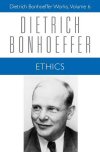
The crown jewel of Bonhoeffer’s body of work, Ethics is the culmination of his theological and personal odyssey. Based on careful reconstruction of the manuscripts, freshly and expertly translated and annotated, this new critical edition features an insightful Introduction by Clifford Green and an afterword from the German edition’s editors.
Though caught up in the vortex of momentous forces in the Nazi period, Bonhoeffer systematically envisioned a radically Christocentric, incarnational ethic for a post-war world, purposefully recasting Christians’ relation to history, politics, and public life. This edition allows scholars, theologians, ethicists, and serious Christians to appreciate the cogency and relevance of Bonhoeffer’s vision.
Bonhoeffer’s Ethics is one of the greatest works of twentieth-century theology, gripping in its capacity to go to the heart of living the Christian life, rich in generative concepts, and still powerfully relevant. This new translation of the authoritative German edition does full justice to a classic text, reads very well, and is superbly edited.
—David Ford, regius professor of divinity, University of Cambridge
All students of Bonhoeffer will relish this new translation and expanded edition of his indispensable Ethics. The power of Bonhoeffer’s words shines more brightly than ever.
—Jean Bethke Elshtain, Laura Spelman Rockefeller Professor of Social and Political Ethics, University of Chicago
Not only does this edition of the Ethics continue the superb scholarly production of Bonhoeffer’s works, but it also contains a wonderful Introduction and afterword by the editors that helps clarify how the Ethics stands in continuity with Bonhoeffer’s earlier work. Anyone interested in Bonhoeffer must own this volume. But just as important, anyone interested in continuing to think through what a Christian ethic is and how it should be done needs to read this book.
—Stanley Hauerwas, Gilbert T. Rowe Professor of Theological Ethics, Duke Divinity School
This new critical edition of Bonhoeffer’s Ethics is a masterful achievement. Based on a more accurate German text painstakingly reconstructed and rearranged, with extensive introductions, commentary notes and bibliography, the translation is fresh and highly readable. Ethics is the key to understanding Bonhoeffer’s theology as it unfolded towards the end of the Third Reich, and especially the key for understanding his involvement in the German resistance. Though never completed, it is one of the most significant and influential of all Christian theological ethics produced in the twentieth century. Many have waited with great anticipation for this new edition of the Ethics. None, I venture, will be disappointed.
—John W. de Gruchy, Robert Selby Taylor Professor of Christian Studies, University of Cape Town, South Africa
The book that Bonhoeffer considered his most important theological work is now available in a form that makes its meaning and its context clear to English-speaking readers. While Bonhoeffer was deeply engaged with the problems of Christian life in Hitler’s Germany, he anticipated our world in remarkable ways. The new translation, notes, and essays clarify Bonhoeffer’s ideas about his own situation and remind us again why his work is still central to the constructive task of Christian ethics today.
—Robin Lovin, Cary M. Maguire University Professor of Ethics, Southern Methodist University

Writing fiction, letters to his family, fiancée, and friends and contending with his interrogator occupied Bonhoeffer during his first year in Tegel Prison. Of the incomplete drama, the novel fragment, and the short story, Bonhoeffer admitted to his friend and later biographer, Eberhard Bethge, “There is a good deal of autobiography mixed with it.” This book discloses a great deal of Bonhoeffer’s family context, social world, and cultural milieu. Events from his life are recounted in a way that embodies and illuminates his theology. Characters and situations that represent Nazi types and attitudes are a form of social criticism and help to explain Bonhoeffer’s participation in the resistance movement and the plot to kill Adolf Hitler, for which he was hanged.

Despite Dietrich Bonhoeffer’s earlier theological achievements and writings, it was his correspondence and notes from prison that electrified the postwar world six years after his death in 1945. The materials gathered and selected by his friend Eberhard Bethge in Letters and Papers from Prison not only brought Bonhoeffer to a wide and appreciative readership, especially in North America, they also introduced to a broad readership his novel and exciting ideas of religionless Christianity, his open and honest theological appraisal of Christian doctrines, and his sturdy, if sorely tried, faith in face of uncertainty and doubt.
This splendid volume, in many ways the capstone of the Dietrich Bonhoeffer Works, is the first unabridged collection of Bonhoeffer’s 1943–1945 prison letters and theological writings. Here are over 200 documents that include extensive correspondence with his family and Eberhard Bethge (much of it in English for the first time), as well as his theological notes, and his prison poems. The volume offers an illuminating introduction by Editor John de Gruchy and an historical afterword by the editors of the original German volume: Christian Gremmels, Eberhard Bethge, and Renate Bethge.
Dietrich Bonhoeffer’s Letters and Papers from Prison has inspired many of us in South Africa and across the world. In these remarkable writings we meet Bonhoeffer at his most vulnerable and human, but also as a man of faith and prayer. Separated from those he loved most, surrounded by destruction, assailed by doubt, and fearing the worst, his hope in Christ remains firm even as his death becomes more certain. And through his profound reflections on what it means to be a Christian he guides us into the twenty-first century. I strongly commend this volume to a new generation of readers.
—Desmond M. Tutu, archbishop emeritus, Cape Town, South Africa
In the tests and trials of imprisonment and imminent death, Bonhoeffer’s faith—as belief, as practice, and as theology—is richly illuminated. Indeed, it becomes luminous. It composes his life and his death into an act of integrity and grace that resists interpretation because it so richly interprets itself.
—Marilynne Robinson, author, Gilead
The most celebrated case of ‘engaged theology.’ Letters and Papers from Prison has inspired generations of theologians all over the world. Confined in a prison cell and expecting death, Bonhoeffer thought of the Christian faith not as a ‘religion’ offering mere consolation, but as a way of living in the here and now with its great world-historic upheavals and little personal joys and sufferings. May the tribe of the readers of this book increase, and may it stimulate new forms of ‘engaged theology,’ uncompromisingly oriented toward God and genuinely faithful to the earth.
—Miroslav Volf, Henry B. Wright Professor of Theology, Yale University

The first of the chronological volumes in this acclaimed critical edition of Bonhoeffer’s work gathers his 100 earliest letters and journals from after the First World War through his graduation from Berlin University. It also contains his early theological writings up to his dissertation. These 17 works include, for example, works on the patristic period for Adolf von Harnack, on Luther’s moods for Karl Holl, on biblical interpretation for Professor Reinhold Seeberg, as well as essays on the church and eschatology, reason and revelation, Job, John, and even joy. Rounding out this picture of Bonhoeffer’s nascent theology are his sermons from the period, along with his lectures on homiletics, catechesis, and practical theology.
In translation for the first time, these writings show Bonhoeffer as pastor and theologian alert to his times and developing the formative themes of his religious worldview.

The period 1928–1931, which followed completion of his dissertation, was formative for Bonhoeffer’s personal and pastoral and theological direction. Almost all of these 900 pages of writings appear in English here for the first time. They document the intense four-year period that included preparation of his postdoctoral thesis; a vicarage in Barcelona; occasional lectures; his postdoctoral academic year at Union Theological Seminary; travel around the United States, Cuba, and Mexico; and his re-entry into the German academic and ecclesial scene.
Barcelona, Berlin, New York is a publishing event of great importance. Readers now and in future generations can follow Dietrich Bonhoeffer through the breakthroughs and transformations in his early journey from ‘the phraseological to the real’: the pastorate in Barcelona, a restless tenure in academe, and the decisive encounters in America, which together form a gateway into a more demanding and complex theological life. The pleasure of this volume comes from Clifford. J. Green’s superb introduction, the generous insights and commentaries of the editorial team, and the intimate and often surprising details that shape Bonhoeffer’s vocation as a public theologian, dissident pastor, and champion of human rights. A major scholarly achievement!
—Charles Marsh, professor of religious studies, The University of Virginia
Dietrich Bonhoeffer scholars and the worldwide church will welcome this new volume focused on Bonhoeffer’s experiences in Barcelona, Berlin, and New York. That this volume is dedicated to the people of the Abyssinian Baptist Church in Harlem is fitting, for Abyssinian strengthened both Bonhoeffer’s unique faith and his prophetic hopes for the church and the world ‘come of age.’
—Josiah Young, professor of systematic theology, Wesley Theological Seminary
This extraordinary volume traces Bonhoeffer’s development during the crucial years 1928–1931 and opens a window into his personal and intellectual life. These writings, most available for the first time in English, are essential reading for anyone interested in Bonhoeffer’s life and theology. The editors have done a superb job putting together a volume that belongs in the library of every student, pastor, and scholar.
—Ronald F. Thiemann, Benjamin Bussey Professor of Theology, Harvard Divinity School
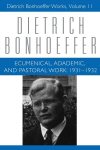
Ecumenical, Academic, and Pastoral Work: 1931–1932, provides a comprehensive translation of Bonhoeffer’s important writings from 1931 to 1932, with extensive commentary about their historical context and theological significance. This volume covers the significant period of Bonhoeffer’s entry into the international ecumenical world and the final months before the beginning of the National Socialist dictatorship. It begins with Bonhoeffer’s return to Berlin in June 1931 after his year of study in the United States. In the crucial period that followed, Bonhoeffer continued his preparations for the ministry, began teaching at Berlin University, and became active at international ecumenical meetings. His letters and lectures, however, also document the economic and political turbulence on the European and world stage, and Bonhoeffer directly addresses the growing threat of the Nazi movement and what it portends not only for Germany, but for the world. Several of the documents in this volume, particularly the student notes of his university lecture on “The Nature of the Church” and his lectures on Christian ethics, give important insights into his theology at this point. His ecumenical lectures and reports are significant documents for understanding the ecumenical debates of this period.

“Then came the crisis of 1933.” This is Bonhoeffer’s own phrase in a letter that documents a turning point in his own life as well as that of the nation. Of Bonhoeffer’s own life at this time, his biographer writes, “The period of learning and roaming” from 1928 until 1931 “had come to an end” as the young lecturer, age 26, began to teach “on a faculty whose theology he did not share” and to preach “in a church whose self-confidence he regarded as unfounded.” Bonhoeffer was becoming part of a society “that was moving toward political, social, and economic chaos.”
Events moved quickly at the onset of 1933 in Berlin. In only 100 days the path was cleared by the German Parliament and the Nazi Party for the establishment of the fascist dictatorship. These 100 days, as well as the preceding and succeeding months, are reflected in the materials in this volume: in letters, in sermons, in Bonhoeffer’s university teaching, in manifestos and a church confession, and in his proactive engagement in the developing church struggle. The vast majority of these are translated here for the first time.
This volume reveals Bonhoeffer’s theological and political response to the rise of fascism in Germany—a decisive turning point in his life that would shape his work from that point on. With powerful clarity, editor Larry Rasmussen’s introduction, commentary, and notes illumine the links between this history and Bonhoeffer’s Christological lectures, his sermons calling the church to repentance and resistance, his critique of National Socialism, his contributions to ecological theology, his understanding of the goodness and godliness of the body and of the human as Earth creature, and his engagement in the conspiracy. Rasmussen provides nuanced interpretation of language, symbols, theological claims, and other contextual factors heavily weighted with moral significance not evident to readers unfamiliar with National Socialism’s appropriation of Christian symbols and with German language, history, and culture. The reader seeking to ‘think with Bonhoeffer’ for the sake of a more just and sustainable world today will find no better resource than these documents and Larry Rasmussen’s brilliant introduction to them.
—Cynthia Moe-Lobeda, associate professor of Christian ethics, Seattle University
This volume spans 12 months in 1932–1933 that proved to be pivotal for Dietrich Bonhoeffer, the people of Germany, and the millions of victims of National Socialism. Larry Rasmussen’s masterful introduction provides an illuminating guide to the various lectures, letters, essays, sermons, and other works Bonhoeffer drafted during this tumultuous period. The translators also make key decisions that invite new and better ways to understand Bonhoeffer’s views on ‘the Jewish question’ and his lectures on Christology. Throughout these pages Bonhoeffer continues to challenge readers to take seriously what it means to follow Christ and to ‘be the church for others.’
—James B. Martin-Schramm, associate professor of religion, Luther College
This volume finally brings us Dietrich Bonhoeffer’s seminal writings surrounding a turning point in history: Adolf Hitler’s ascent to power in 1933 and the beginning of one of history’s darkest chapters. Grounded firmly in his Christian convictions, Dietrich Bonhoeffer was among the first to take a clear and uncompromising stand against the atrocities of the Nazi regime. This long-awaited volume provides us with essential information on Bonhoeffer’s courageous and unrelenting struggle with monstrous Nazi politics, grotesque ‘Aryan theology,’ and a church divided against itself. Bonhoeffer’s famous essay ‘The Church and the Jewish Question’ is among the many captivating documents contained in this work, displaying his exceptional prophetic analysis of reality and theological acuteness. prefaced by a deeply insightful introduction, this critical edition of Bonhoeffer’s works offers the highest scholarship in a very readable translation.
—Christine Schliesser, author, Everyone Who Acts Responsibly Becomes Guilty: Bonhoeffer’s Concept of Accepting Guilt
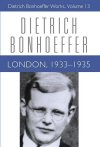
Dietrich Bonhoeffer’s pastoral sojourn in England from October 1933 to April of 1935, which he initially viewed as a withdrawal from the church clashes in Germany, marked instead a new phase in his intensive participation in that struggle. This enlightening volume provides an almost daily documentation of his deepening engagement against the placid backdrop of his two London pastorates.
Detailing Bonhoeffer’s extensive contacts with German expatriates, ecumenical partners and allies, and friends and family, London: 1933–1935 impressively records both Bonhoeffer’s involvement in the rapidly developing clash with the deutsche Christen and the means by which he pursued it.
The bulk of the material consists of his wide correspondence but also includes records and minutes of his congregational meetings, excerpts from the diaries of Bonhoeffer’s friend and London colleague Julius Rieger, reports from international conferences from 1934, and more than 20 sermons he preached to his London congregations. The wealth of this material, says editor Keith Clements, allows us to experience a dramatic slice of this history and see the many and complex facets of Dietrich Bonhoeffer’s personality.
Bonhoeffer’s 18 months in London coincided with the most crucial period of the German church struggle. With a number of historical documents published here for the first time, this volume gives us a rare glimpse of his pivotal role from abroad and the early reactions to National Socialism in Great Britain. Beautifully translated, the letters and sermons give us new insights into Bonhoeffer himself.
—Victoria J. Barnett, director, church relations, United States Holocaust Memorial Museum
Taking its place in what has become a definitive series, this splendid new volume captures Dietrich Bonhoeffer busily at work in a lively new landscape. More than this, it yields a vivid glimpse of that bustling, wider realm of opinion, friendship, and endeavor which the crisis of National Socialism provoked beyond the borders of Germany itself. It is surely indispensable.
—Andrew Chandler, director, George Bell Institute at the University of Chichester
Bonhoeffer’s sojourn in London during 1933–1935 was as critical for his own formation as it was for his contribution to the German church struggle. Volume 13 demonstrates why this was so by providing us with as complete a record as possible of his London correspondence, sermons, talks, and reports. This is an enormously rich resource for anyone interested in Bonhoeffer’s life as thought during that earthshaking period in European history.
—John W. de Gruchy, Robert Selby Taylor Professor of Christian Studies, University of Cape Town, South Africa

In the spring of 1935, Dietrich Bonhoeffer returned from England to direct a small illegal seminary for the Confessing Church. The seminary existed for two years before the Gestapo ordered it closed in August 1937. The two years of Finkenwalde’s existence produced some of Bonhoeffer’s most significant theological work as he prepared these young seminarians for the turbulence and risk of parish ministry in the Confessing Church. Bonhoeffer and his seminarians were under Gestapo surveillance; some of them were arrested and imprisoned. Throughout, he remained dedicated to training them for the ministry and its challenges in a difficult time. This volume includes Bible studies, sermons, and lectures on homiletics, pastoral care, and catechesis, while also offering a moving and up-close portrait of the Confessing Church in these crucial years—the same period during which Bonhoeffer wrote his classics, Discipleship and Life Together.

With extensive commentary about their historical context and theological significance, this volume of writings covers a crucial time and an understudied period of Bonhoeffer’s life. It begins during the final period of his illegal work in training Confessing Church seminarians and concludes as he begins his activities in the German resistance. Bridging these two periods is his brief journey to the United States in summer 1939, when he pondered and ultimately rejected a move to the safety of exile. Bonhoeffer’s writings from this transitional period, particularly his New York diary, offer a rare and more deeply personal picture of Bonhoeffer in a time of great inner turmoil.
Banned by the Gestapo in 1937 from preaching and teaching, Bonhoeffer went through a period of existential insecurity. How could he best uphold his forthright Christian witness against Nazi totalitarian claims? One recourse was to maintain his theological education activities underground and illegally. Another was to go abroad and thus avoid conscription for military service. But a quick visit to New York in the summer of 1939 convinced him that such an exile would be a mistake. He had too many ties to his family, his seminarians, and to his country. He returned to Germany just before Hitler launched his wars of aggression in September 1939. This meticulously edited and translated collection of Bonhoeffer’s letters and papers for this period describes his often traumatic dilemmas, both theological and personal, in his attempt to remain true to his vocation in these critical years of conflict and confrontation.
—John S. Conway, author, The Nazi Persecution of the Churches 1933–1945
This is one of the most absorbing and illuminating volumes of the Bonhoeffer collected works, giving us the Bonhoeffer who struggled under terrible circumstances in Nazi Germany to provide seminary training worthy of the Christian name, even as he struggled with fundamental decisions about his future. We are indebted to the editors and translators for another superb volume in this series.
—Gary Dorrien, Reinhold Niebuhr Professor of Social Ethics, Union Theological Seminary Professor of Religion, Columbia University
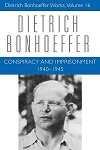
This volume, published in the year of the 100th anniversary of Bonhoeffer’s birth, documents Bonhoeffer’s life under the increasing restraints and fateful events of World War II Germany.
In hundreds of letters, including 10 never-before-published letters to his fiancée, Maria von Wedemeyer, as well as official documents, short original pieces, and a few final sermons, the volume sheds light on Bonhoeffer’s active resistance to and increasing involvement in the conspiracy against the Hitler regime, his arrest, and his long imprisonment. Finally, Bonhoeffer’s many exchanges with his family, fiancée, and closest friends, demonstrate the affection and solidarity that accompanied Bonhoeffer to his prison cell, concentration camp, and eventual death.
An abundance of riches awaits anyone who turns to this magnificent volume. Never before could we see in such luminous detail how Bonhoeffer related his ethics to his involvement in political resistance. This is Bonhoeffer up close and personal during the last period of his life. Letters, essays, sermons, and more show him addressing challenges, ambiguities and terrors that were pressing for him then, and as will be clear to many, are . . . no less pressing for us today.
—George Hunsinger, Hazel Thompson McCord Professor of Systematic Theology, Princeton Theological Seminary
This final volume of Dietrich Bonhoeffer Works provides essential information on the Confessing Church and the conspiracy against the Nazi regime. Mark Brocker’s introduction includes a particularly clear account of Bonhoeffer’s complex life from his return to Germany in late 1939 to his death in April, 1945. In the documents collected here, we see how a new vision of both church and state began to emerge in Germany well before the end of the war. Conspiracy and Imprisonment shows the importance of Bonhoeffer’s contribution to that vision and . . . the sacrifices he and others made for it.
—Robin Lovin, Cary M. Maguire University Professor of Ethics, Southern Methodist University
This volume contains the most dramatic documentation of Dietrich Bonhoeffer’s defiance of the Hitler regime. It is the essential and long-awaited volume for an understanding of Bonhoeffer’s part in the resistance and conspiracy against Hitler in the years 1940–1943, demonstrating, in Bonhoeffer’s own notes and letters, and in Gestapo and court documents, Bonhoeffer’s engagement on behalf of Jews, which led to his arrest in 1943 and execution on 9 April 1945.
—Peter Hoffman, William Kingsford Professor, McGill University
Dietrich Bonhoeffer (1906–1945) was a German theologian, pastor, and ecumenist, was a professor in Berlin, an uncompromising teacher in the Confessing Church, and a consistent opponent of National Socialism. Executed by Hitler at the end of World War II, his influence continues today as one of the most important theologians of the twentieth century.
Reviews
2 ratings

Debra W Bouey
8/13/2015

Larry Proffitt (I
7/9/2014